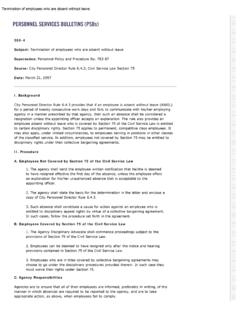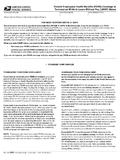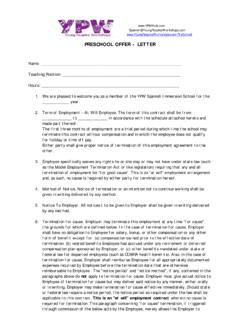Transcription of OECD MODEL TAX CONVENTION: Tax Treaty Treatment of ...
1 OECD MODEL TAX convention : Tax Treaty Treatment of Termination Payments Discussion Draft: 25 June to 13 September 2013 1 25 June 2013 TAX Treaty Treatment OF TERMINATION PAYMENTS Public discussion draft Paragraph 4 of the Commentary on Article 18 indicates that various payments may be made to an employee following cessation of employment. Whether or not such payments fall under the Article will be determined by the nature of the payments, having regard to the facts and circumstances in which they are made, as explained in the following two paragraphs . Paragraphs 5 and 6 of the same Commentary discuss the extent to which such payments constitute pensions or other similar remuneration . These paragraphs, however, do not address how other provisions, such as Article 15, apply to a variety of payments, such as non-competition payments, that may be made following the termination of an employment.
2 Since the inconsistent Treaty characterisation of payments received following the termination of employment creates risks of double taxation and non-taxation, the OECD Committee on Fiscal Affairs, through a subgroup of its Working Party 1 on Tax Conventions and Related Questions, has undertaken work aimed at clarifying how such payments should be treated for tax Treaty purposes. This public discussion draft includes proposals for additions and changes to the Commentary on the OECD MODEL Tax convention resulting from the work of that subgroup. These proposals have recently been presented to the Working Party for discussion with a view to their possible inclusion in the OECD MODEL Tax convention . Given the fact that the proposals included in this note relate to a variety of payments that may be made to a large number of individuals, the Working Group concluded that its discussion of these proposals would benefit from the views and experience of interested parties and, in particular, of people and organisations (including advisers and representatives from human resources departments) who regularly deal with the tax situation of employees who exercise employment activities in different countries.
3 The Committee therefore invites interested parties to send their comments on this discussion draft before 13 September 2013. These comments will be examined at the September 2013 meeting of the Working Party. Comments on this discussion draft should be sent electronically (in Word format) by email to and should be addressed to: Tax Treaties, Transfer Pricing and Financial Transactions Division OECD/CTPA Unless otherwise requested at the time of submission, comments submitted in response to this invitation will be posted on the OECD website. This document is a discussion draft released for the purpose of inviting comments from interested parties. It does not necessarily reflect the final views of the OECD and its member countries.
4 2 TABLE OF CONTENTS 1. Remuneration for previous work .. 3 2. Payment for unused holidays or sick leave .. 3 3. Payment in lieu of notice of termination .. 5 4. Severance payment .. 6 5. Payment of damages for unlawful dismissal .. 6 6. Non-competition payment .. 7 7. Payment related to pension rights .. 8 8. Deferred remuneration .. 9 9. Payment under an incentive compensation arrangement .. 9 10. Fringe benefits for the period after employment .. 10 11. Compensation for loss of earnings on or after termination following injury or disability .. 10 12. Compensation for loss of future commissions .. 11 13. Partial retirement 12 ANNEX - P roposed changes to the Commentary .. 14 3 TAX Treaty Treatment OF TERMINATION PAYMENTS 1. Remuneration for previous work Description of the payment 1.
5 Payment of remuneration for work done before the termination of employment will often be made after the employment has been terminated. Such remuneration could cover a salary for the last days of work but also a bonus for a previous year, commissions for sales made before termination, etc. Proposal 2. The Group recommends that the tax Treaty Treatment of this type of payment should be clarified through the following addition to the Commentary on Article 15: In some cases, it may be difficult to determine which part of salaries, wages and other similar remuneration paid to an individual are derived from the exercise of employment in a given State. Paragraphs to below address this issue with respect to the granting of stock-options to an employee who exercises his employment in different States.
6 The issue may also arise in the case of payments made after the termination of employment. Regardless of the terminology used to describe these payments, it is essential to identify the real consideration for each such payment on the basis of the facts and circumstances of each case in order to determine whether the payment constitutes salaries, wages or other similar remuneration and the extent to which the payment, or part thereof, may be considered to derive from the exercise of employment in a given State. The following paragraphs discuss these questions with respect to different types of payments that are often made following the termination of employment. Any remuneration paid after the termination of employment for work done before the employment was terminated ( a salary or bonus for the last period of work or commissions for sales made during that period) will be considered to be derived from the State in which the relevant employment activities were exercised.
7 Analysis 3. The Group agreed that Article 15 would apply to this form of remuneration, which would be sourced where the employee carried on the relevant work during the period covered by the remuneration. 2. Payment for unused holidays or sick leave Description of the payment 4. After termination of employment, an employee may receive compensation for holidays and/or sick leave to which he was entitled, but did not use, during his period of employment. 4 Proposal 5. The Group recommends that the tax Treaty Treatment of this type of payment should be clarified by adding the following to the Commentary on Article 15: A payment made with respect to unused holidays / sick days that accrued during the last year of employment is part of the remuneration for the period of work that generated the holiday or sick leave entitlement.
8 An employee may also be entitled, at the end of employment, to the payment for holidays and sick days related to a number of previous years that were unused during these years. Absent facts and circumstances showing otherwise, a payment received after termination of employment as compensation for holidays and sick days related to previous years that were unused during these years should be considered to have been a benefit for which the employee was entitled for the last year of employment. One situation where a different conclusion would be justified would be where it would be established, on the basis of the taxpayer s employment records, that these holidays and sick days clearly relate to specific periods of past employment and that the payment constitutes remuneration for these periods of employment.
9 States should take account, however, of the fact that the former employee may have been previously taxed on these holidays and sick days at the time of their accrual. Assume, for instance, that under a State s domestic tax law, holidays and sick days granted with respect to periods of work performed on the territory of that State are treated as a benefit taxable during the fiscal year during which the relevant work was performed and are taxed accordingly. In such a case, the State of residence of the former employee at the time of the subsequent payment with respect to the holidays / sick days would need to provide relief of double taxation for such tax and any State in which the former employee may have worked during his last year of employment should similarly consider that any payment for previous years unused holiday / sick days that were already taxed on an accrual basis did not relate to employment activities exercised during the last year.
10 Analysis 6. The Group generally agreed that such a payment should be treated the same way as remuneration for holidays / sick days taken during the employment: the remuneration paid with respect to the holidays or sick leave is part of the remuneration for the period of work that generated the holiday or sick leave entitlement and, as such, should be covered by Article 15 and sourced where work was performed during that period. 7. The practical difficulty that arises in this case, as in the case of some of the following payments, is where the holidays or sick days have accrued over many years and the employment has been performed in a number of States. 8. The Group agreed that this issue required a solution that could reconcile the principle of taxation in the State where the work that generated the holiday or sick leave entitlement was performed and the need for a workable approach.
















